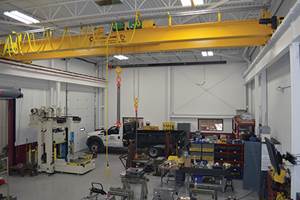Calling All Moldmakers: The International Marketplace Is Not a Buzzword, It Is a Reality!
Growth Strategies for the U.S. moldmaker
The global economy is a risky one, with uncertainty and hazards hiding behind every door. But also lying behind each international doorway are incredible opportunities that your competitors might already be tapping into very successfully.
To steal from another phrase, "Act locally, trade globally." Even if you are not expanding your business internationally, you can bet that your customers, your suppliers and your competitors likely are. And they are doing so rapidly. On average, U.S. plastics companies have been adding about five percent annually to their pay-rolls in export jobs since 1992, with export jobs in the U.S. plastics industry alone responsible for more than 14 percent of plastics industry employment.
Unfortunately, international growth has been less for moldmakers, who have experienced rigorous international competition in recent years. Fortunately, the trade deficit in molds has been decreasing. Though the trade deficit for molds is decreasing from a high of $1 billion in 1995, it was still $376 million in 1998. On the other hand, the U.S. plastics raw materials and products sectors continue to show trade surpluses, with a total of $7.6 billion in 1998. Exports of plastics products have increased an im-pressive 43 percent since 1994.
Why have moldmakers not seen the same type of trade surpluses other plastics sectors have? There are a host of reasons - such as a tight labor market, a strong dollar and global financial turmoil - that have made conditions ripe for increased imports. In addition, U.S. moldmakers always have had the comfort of a growing domestic economy and have not had the need to look outside their borders. Further-more, many processors have been compelled to enter into the global arena in recent years in order to follow their customers.
However, many moldmakers are now realizing that if they are to remain competitive in this internationally integrated economy, they must think and act globally by following their customers. Yet, this can be difficult for the small- to medium-sized moldmaker, who may not have the resources to thoroughly examine which markets may offer the most opportunities and which market-entry strategy would best suit company needs.
That is where a trade association such as The Society of the Plastics Industry, Inc. (SPI) can help. The SPI International Trade Advisory Committee (ITAC), which serves to enhance the global competitiveness of SPI members, has significantly increased its valuable programs to help guide companies through the difficult maze of international business.
The SPI ITAC has grown from five company members in 1993 to more than 115 today and includes broad representation from the processor, raw material, moldmaking and equipment manufacturing sectors. The committee meets the growing needs of the industry in the international marketplace through educational forums, innovative tools to help members improve their business, facilitation of networking among the industry's top international executives and development of SPI policies on key international trade issues.
ITAC sponsors various educational events and makes available numerous publications to help companies navigate the complexities of the global marketplace. ITAC's goal is to provide the information companies need to achieve a continuing and sustainable presence in international markets. To do this companies need spec-ific plastic-related information on coun-tries throughout the world, as well as answers to international business questions.
Gathering the vital international information necessary to make an important business decision often can be an arduous task, even for the seasoned international professional. ITAC's Internet Website (www.plasticexport.org) offers SPI mem-bers a "one-stop shop" for extensive marketing data from more than 50 coun-tries, updates on important trade issues, current trade statistics on imports and exports, hundreds of international links and much more.
But often the best information is found by talking to those who have been there. ITAC meetings and forums feature outstanding speakers on key growing markets and global business issues and provide a comfortable setting to network with industry peers. In addition, trade missions sponsored by SPI, the Department of Commerce or other groups also are excellent ways to see and learn an international market's potential firsthand.
The U.S. market for plastics molds still is growing, but the growth potential outside of our borders dwarfs that of our own. As moldmaking companies look toward expanding their current international markets or opening new ones, the SPI International Trade Advisory Committee will continue to pursue valuable programs that assist companies in the international marketplace.
For more details contact Lori Anderson of ITAC at (202) 974-5281 or via e-mail at: landerso@socplas.org.
Related Content
Making Quick and Easy Kaizen Work for Your Shop
Within each person is unlimited creative potential to improve shop operations.
Read MoreThe Trifecta of Competitive Toolmaking
Process, technology and people form the foundations of the business philosophy in place at Eifel Mold & Engineering.
Read MoreEditorial Guidelines: Editorial Advisory Board
The Editorial Advisory Board of MoldMaking Technology is made up of authorities with expertise within their respective business, industry, technology and profession. Their role is to advise on timely issues, trends, advances in the field, offer editorial thought and direction, review and comment on specific articles and generally act as a sounding board and a conscience for the publication.
Read MoreThink Safety: Eliminate Hazards Throughout the Shop
The tooling community is taking advantage of new products for safer mold shops and molding facilities.
Read MoreRead Next
How to Use Strategic Planning Tools, Data to Manage the Human Side of Business
Q&A with Marion Wells, MMT EAB member and founder of Human Asset Management.
Read MoreAre You a Moldmaker Considering 3D Printing? Consider the 3D Printing Workshop at NPE2024
Presentations will cover 3D printing for mold tooling, material innovation, product development, bridge production and full-scale, high-volume additive manufacturing.
Read MoreHow to Use Continuing Education to Remain Competitive in Moldmaking
Continued training helps moldmakers make tooling decisions and properly use the latest cutting tool to efficiently machine high-quality molds.
Read More




















